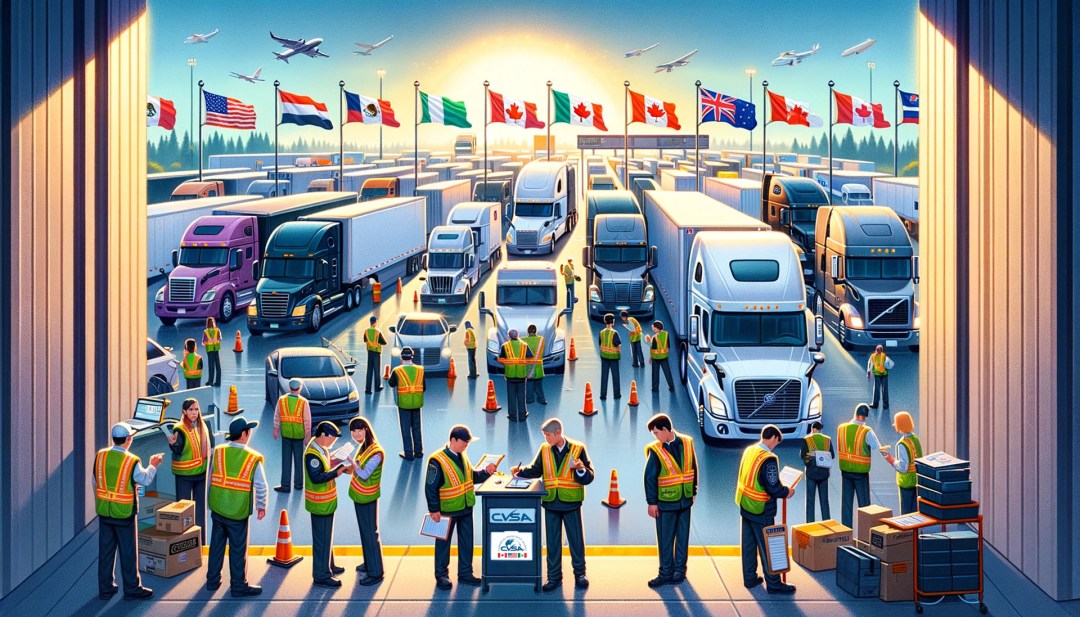Annually, the Commercial Vehicle Safety Alliance (CVSA) prepares for a pivotal occasion that scrutinizes the safety of commercial motor vehicles throughout North America. It’s called International Roadcheck, and it’s a crucial time for drivers and carriers to ensure they’re hitting the mark on compliance and road safety. This year, special attention is turning towards tractor protection systems and addressing alcohol and substance possession concerns among drivers.
Dive into the essence of these thorough checks, executed by experts certified by CVSA, to grasp their depth and significance. Embarking on this journey, we’ll meticulously dissect the inspection procedure, ensuring you grasp every detail anticipated along the way. Plus, we’ll share some solid advice on how both motor carriers and drivers can prep effectively—because making sure your vehicle passes with flying colors isn’t just about avoiding fines; it’s about keeping everyone safe on our roads.
Last but not least, we’ll touch upon the consequences of failing an inspection because knowing what’s at stake can motivate better preparation. So buckle up; there’s lots to learn.
Table of Contents:
- Understanding International Roadcheck
- What is International Roadcheck?
- Focus Areas for This Year’s International Roadcheck
- The Inspection Process Explained
- Preparing for Roadcheck as a Motor Carrier or Driver
- The Consequences of Failing an Inspection
- Educational Initiatives Linked to International Roadcheck
- Conclusion
Understanding International Roadcheck
The Commercial Vehicle Safety Alliance’s (CVSA) International Roadcheck, set for May 14-16, isn’t just another mark on the calendar. It stands as a cornerstone event in North America aimed at ensuring commercial motor vehicle safety and regulatory compliance across Canada, Mexico, and the United States.
During this trio of days, a multitude of commercial transports and their operators undergo rigorous examination to confirm they meet the requisite safety protocols and functional regulations. Think of it as a massive health check-up for trucks that helps keep our roads safe.
Why is this so critical? Because when it comes to hauling goods across vast distances, there’s no room for error. A single faulty braking system or an improperly secured cargo can lead to disastrous outcomes not just for the driver but also for the general public sharing the road.
What is International Roadcheck?
In essence, International Roadcheck serves two main purposes: improving commercial motor vehicle operations and enhancing overall road safety. Throughout this specialized monitoring initiative, inspectors certified by the CVSA carry out comprehensive examinations, scrutinizing elements ranging from how cargo is fastened to the functionality of braking mechanisms.
To give you an idea of its scale—this annual three-day event has become known as one of North America’s largest targeted enforcement programs focused solely on safe commercial motor vehicle operations. Tackling these problems directly with meticulous inspections, the campaign is pivotal in making our highways a secure environment for all. Its impact is significant, underlining the importance of continuous efforts to maintain high safety standards across the industry.
Focus Areas for This Year’s International Roadcheck
This year, the spotlight during the International Roadcheck is on tractor protection systems and tackling alcohol and controlled substance possession among commercial drivers. Let’s break down why these focus areas are critical.
Tractor Protection Systems
The heart of a safe haul lies in its tractor protection systems. In the case where a trailer decides to part ways or develops a leak, these mechanisms step in to halt any air from escaping, guaranteeing that both parts of the vehicle can achieve a secure halt. Inspectors will be paying close attention to components like the tractor protection valve and trailer supply valve, vital cogs in this safety mechanism. With the Commercial Vehicle Safety Alliance (CVSA)‘s emphasis on these checks, it’s clear how crucial they are for preventing potentially disastrous incidents on our roads.
Moreover, given their role in safeguarding not just cargo but also lives, understanding and maintaining these systems should be at the top of every driver’s checklist.
Alcohol Substance Possession Concerns
In addition to mechanical integrity, this year’s roadcheck puts a significant emphasis on driver sobriety with strict scrutiny over alcohol and controlled substance possession. This initiative seeks to guarantee that drivers, unencumbered by the influence of drugs or alcohol, can navigate their vehicles securely, an essential measure given the heightened likelihood of accidents due to such impairments.
To combat this issue head-on,The Federal Motor Carrier Safety Administration (FMCSA), along with CVSA-certified inspectors have intensified efforts to educate industry members about enforcing policies against substance misuse within operations.
The Inspection Process Explained
Every year, trucks and their drivers face the gauntlet known as the International Roadcheck. Conducted by CVSA-certified inspectors, this event isn’t just a pop quiz on road safety; it’s more like the final exams for commercial vehicles across North America.
Level I Inspection Criteria
Regarded as the pinnacle of scrutiny, the Level I Inspection distinguishes itself with a comprehensive 37-point examination protocol. This isn’t your average once-over. Inspectors meticulously check everything from vehicle components to driver documentation to make sure they meet strict safety standards. Imagine having every inch of your workspace scrutinized with such detail—that’s what these trucks go through.
This thorough examination covers critical areas including braking systems, cargo securement, and lighting—essentially ensuring that all parts of the truck are in tip-top shape and pose no danger to other road users. Drivers aren’t left out either; their documents undergo rigorous checks to ensure compliance with hours-of-service regulations and possession of proper endorsements.
So, what’s in it for you to pay attention to this detailed scrutiny? Because it directly impacts everyone who shares the road with these commercial behemoths. The aim here is not just regulatory hoop-jumping but ensuring that when a truck whizzes past you on the highway, it’s as safe as can be. Here’s where you can dive deeper into how CVSA-certified inspectors conduct their business during International Roadcheck.
Preparing for Roadcheck as a Motor Carrier or Driver
If you’re in the thick of motor carrier operations or behind the wheel of a commercial motor vehicle, the International Roadcheck is more than just another date on your calendar. Spanning three days, this rigorous examination sprawls throughout North America—embracing Canada and Mexico alike—as it subjects both conveyances and operators to a meticulous evaluation, ensuring their adherence to prescribed safety norms.
To avoid any hiccups during this period, it’s crucial for commercial motor vehicle drivers to stick closely to their company’s rules about alcohol and controlled substances. It sounds like common sense because it is—yet every year some get caught off-guard. As part of preparing, make doubly sure that there are no forbidden substances in your system or possession; doing so not only keeps you safe but also ensures you’re compliant with regulations.
On the flip side, if you manage a fleet within this sphere—big or small—you’ve got homework too. Establishing clear policies against substance use in your operation isn’t optional; it’s essential for driver safety and legal compliance. But here’s where things get proactive: don’t just set these rules up and walk away. Enforce them rigorously through regular checks and balances within your organization. Learn more about setting up effective workplace policies.
Remember: When vehicles with out-of-service violations are flagged during inspections—they can’t operate until those issues are fixed—that goes double for drivers found violating substance control protocols.
The Consequences of Failing an Inspection
Not passing the International Roadcheck might result in severe consequences for both trucks and their operators, particularly if they’re hit with out-of-service infractions. Let’s unpack what these entail.
Vehicle Out-of-Service Violations
If a commercial motor vehicle is flagged with out-of-service violations, it means there’s immediate danger or severe non-compliance issues that need fixing right away. This could range from critical mechanical failures to safety equipment malfunctions. The bottom line? These vehicles will be parked until every issue is addressed and resolved. It’s not just about putting a band-aid on; it requires thorough corrections to get back on the road legally and safely.
Imagine being sidelined during peak delivery times because of avoidable oversights like inadequate cargo securement or faulty braking systems. This snag in the system hampers everything from your neighborhood package drop-offs to the intricate workings of global supply networks.
Driver Out-of-Service Violations
Drivers aren’t off the hook either if they fail inspections due to out-of-service violations. From documentation errors to hours of service breaches or even substance possession concerns—these infractions stop them in their tracks too. They’ll find themselves unable to operate any commercial motor vehicle until they’ve rectified these issues which might involve retraining, fines, or more stringent measures depending on the severity of the violation.
This scenario underscores why staying informed through CVSA’s educational initiatives is crucial for everyone involved in commercial vehicle operations—it’s all about ensuring safe roads for us all by adhering strictly to regulatory compliance standards.
Educational Initiatives Linked to International Roadcheck
The CVSA firmly believes in empowering through education to enhance the safety of commercial vehicles traversing North America’s highways. That’s why they’re big on education during their annual International Roadcheck event.
In 2024, from the 14th to the 16th of May, spanning across Canada, Mexico, and the USA, emphasis is placed not solely on vehicle checks but also on educating drivers and transport firms about essential safety protocols. Through educational initiatives linked directly to the International Roadcheck, CVSA aims to reduce accidents and enhance compliance with federal regulations concerning vehicle operations.
In their educational crusade, they shine a spotlight on grasping the essence of tractor protection systems—key in averting air depletion in trailers—and the perils tied to carrying alcohol and controlled substances for those behind the wheel commercially. By addressing these issues head-on through targeted learning materials and outreach programs, CVSA hopes to foster a culture of safety that transcends borders.
Additionally, by explaining what goes into a Level I Inspection—the most comprehensive inspection covering both vehicle components and driver documentation—drivers can better prepare themselves for what inspectors are looking out for. Understanding the intricacies of inspections alleviates worry and encourages more responsible behavior on the roads.
Finally, emphasizing the significant repercussions of not passing an inspection because of critical violations underlines how vital it is to stick to safety norms. The results go beyond mere punishment; they underscore the vital role of responsibility in managing commercial vehicle activities.
Conclusion
International Roadcheck sets the bar for safety. It’s a deep dive into compliance, focusing on tractor protection systems and substance concerns this year. Remember, preparation is key.
Understand what inspectors look for during the 37-step inspection process. Knowledge here can make all the difference in passing or facing out-of-service violations.
Motor carriers and drivers, take note: adhering to policies on controlled substances isn’t just about following rules—it’s about ensuring everyone’s safety on the road.
Failing an inspection has real consequences. Vehicles get sidelined; drivers face restrictions. But it’s not just about avoiding penalties—it’s about commitment to safety above all else.
To put it succinctly, the essence of International Roadcheck transcends mere regulatory enforcement; it serves as a collective call to action for ensuring the secure conduct of commercial vehicle activities throughout North America.
More From Our Blog
Turning Tragedy into Action: Kelly’s Crusade for Safer Roads
Every parent of a teen driver understands the anxiety that accompanies watching their child drive away. The open road, while a symbol of freedom, is also fraught with potential dangers that can lead to a parent's worst nightmare. For a couple in Northeast Ohio, this...
Safe Driver Week 2024: Top 10 Dangerous Driving Behaviors to Watch For
Operation Safe Driver Week 2024 Safe Driver Week kicks off on Monday, highlighting the critical importance of identifying and avoiding hazardous driving behaviors. To keep our roads safe, let's dive into the top 10 risky driving habits that threaten the well-being of...
Understanding and Mitigating Our Risk: A Call to Safer Driving
In July 2023, the United States witnessed over 500,000 motor vehicle crashes. The primary causes of these crashes, injuries, and fatalities can be traced back to a few critical factors for safer driving. Distracted Driving: This remains a significant cause of...




The link isn’t working in this article it gives a 404 error.
Looks to be online, please refresh your browser.
Thank you!